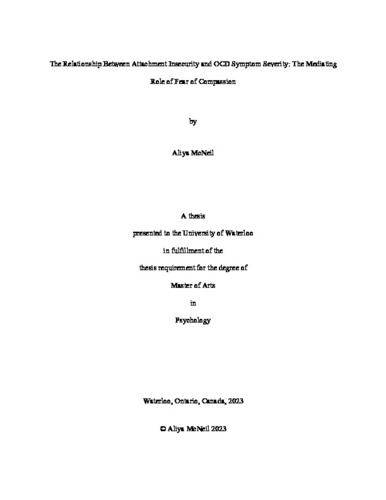| dc.contributor.author | McNeil, Aliya | |
| dc.date.accessioned | 2023-08-17 13:15:55 (GMT) | |
| dc.date.available | 2023-08-17 13:15:55 (GMT) | |
| dc.date.issued | 2023-08-17 | |
| dc.date.submitted | 2023-08-14 | |
| dc.identifier.uri | http://hdl.handle.net/10012/19703 | |
| dc.description.abstract | Obsessive-compulsive disorder (OCD) is characterized by distressing intrusive thoughts and compulsions implemented to neutralize the thoughts or mitigate potential harm. Attachment focused approaches to conceptualizing OCD are becoming more common, owing to the relationship between insecure attachment and OCD. However, the mechanism responsible for this relationship is unclear. Negative attachment experiences predict increased anxiety and fear of compassion (FOC) which can impede the expression and acceptance of affiliative emotions. FOC also mediates the relationship between attachment insecurity and emotional distress. Thus, we hypothesized that FOC may play a similar mediating role in the relationship between attachment insecurity and OCD. Two online survey studies were pre-registered and completed by undergraduate students. Study one (N=329) revealed that fear of self-compassion mediates the relationship between attachment anxiety and OCD symptom severity and that fear of receiving compassion mediates the relationship between attachment avoidance and OCD symptom severity. Contrary to our hypothesis, fear of expressing compassion was not a significant mediator. Study two (N=340) aimed to replicate and extend these findings in a new sample, while also controlling for depression. Consistent with our hypotheses, the results replicated. FOC is often related to beliefs that compassion will result in complacency. People with OCD may worry about becoming complacent in compulsions, which could ultimately result in being held responsible for harm. Our results suggest that FOC may be an important consideration when treating OCD, particularly among those with insecure attachment styles. Although cognitive-behavioural therapy (CBT) is the gold standard treatment for OCD, the efficacy is only about 50 percent. As such, research exploring adjunct treatment options and ways to incorporate attachment and compassion-focused approaches into case formulation is warranted. | en |
| dc.language.iso | en | en |
| dc.publisher | University of Waterloo | en |
| dc.subject | obsessive compulsive disorder | en |
| dc.subject | anxiety | en |
| dc.subject | attachment | en |
| dc.subject | compassion | en |
| dc.subject | fear of compassion | en |
| dc.title | The Relationship Between Attachment Insecurity and OCD Symptom Severity: The Mediating Role of Fear of Compassion | en |
| dc.type | Master Thesis | en |
| dc.pending | false | |
| uws-etd.degree.department | Psychology | en |
| uws-etd.degree.discipline | Psychology | en |
| uws-etd.degree.grantor | University of Waterloo | en |
| uws-etd.degree | Master of Arts | en |
| uws-etd.embargo.terms | 0 | en |
| uws.contributor.advisor | Purdon, Christine | |
| uws.contributor.affiliation1 | Faculty of Arts | en |
| uws.published.city | Waterloo | en |
| uws.published.country | Canada | en |
| uws.published.province | Ontario | en |
| uws.typeOfResource | Text | en |
| uws.peerReviewStatus | Unreviewed | en |
| uws.scholarLevel | Graduate | en |

